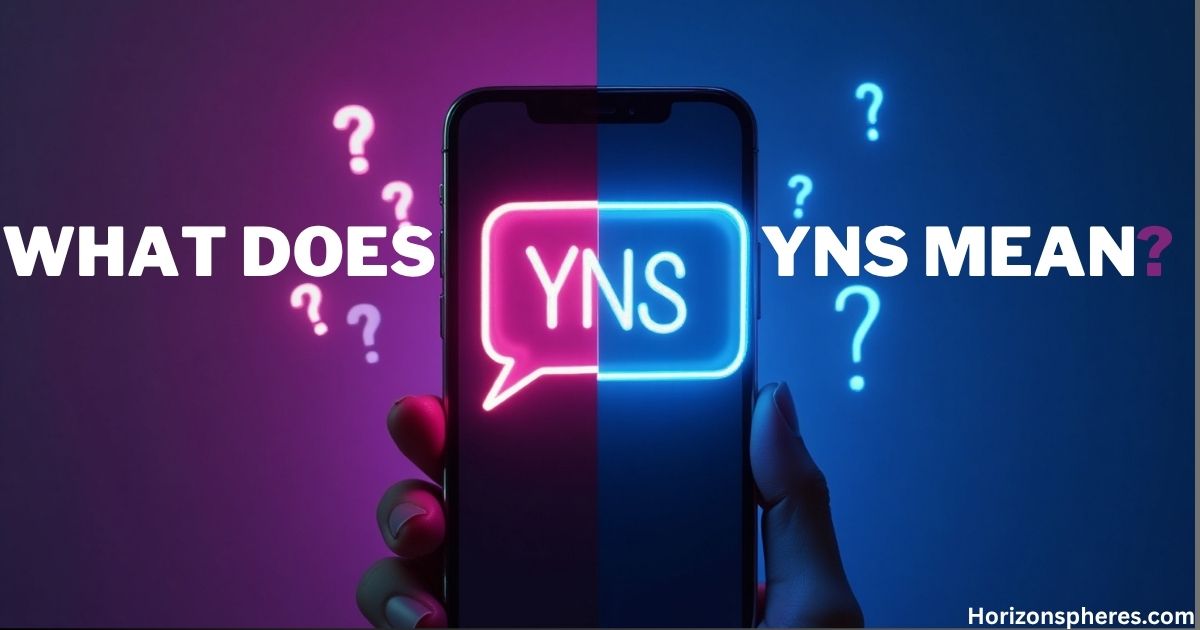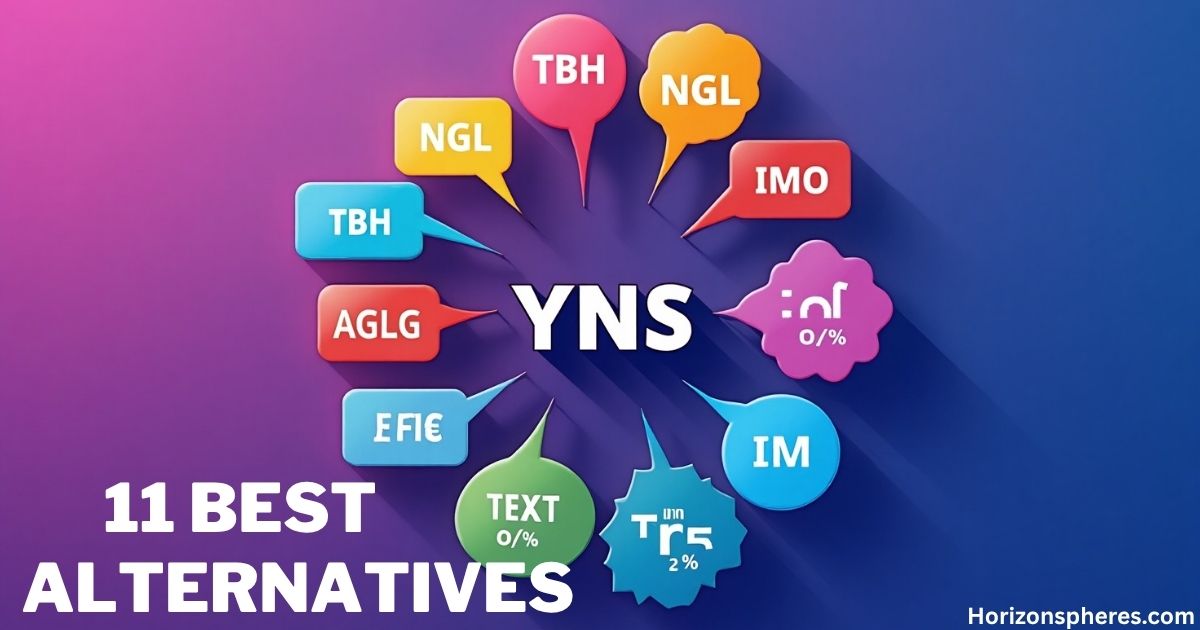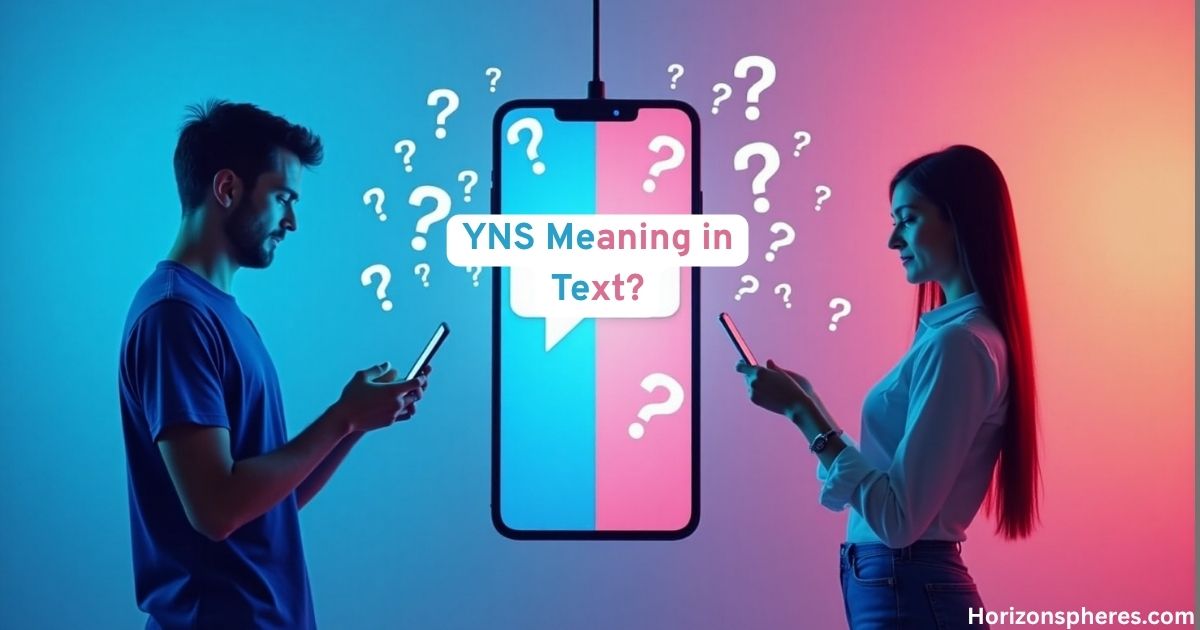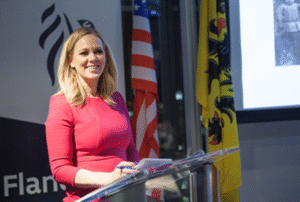Ever seen YNS pop up in your Instagram DMs or TikTok comments and wondered what it means? You’re not alone. This trendy abbreviation has taken social media by storm, but understanding YNS meaning in chat conversations requires knowing the context. Let’s decode this popular slang and explore better alternatives for every situation.
What Does YNS Mean?

YNS stands for “You’re Not Serious” – the primary interpretation dominating social platforms today. This casual abbreviation expresses disbelief, surprise, or playful sarcasm when someone shares something shocking or unexpected.
However, context matters significantly. YNS meaning urban dictionary sources also list alternative interpretations like “You Never Said” or “Your Next Step,” though these remain less common in everyday digital conversations.
| YNS Variation | Full Meaning | Usage Context | Popularity Level |
| You’re Not Serious | Primary meaning | Social media reactions | Very High |
| You Never Said | Secondary meaning | Argument contexts | Medium |
| Your Next Step | Tertiary meaning | Planning discussions | Low |
Real-world examples showcase typical usage patterns:
- Friend: “I bought a $500 designer hoodie”
- Response: “YNS 😭 Why spend that much?”
The emotional undertones range from lighthearted teasing to genuine shock, depending on delivery and relationship dynamics between communicators.
Popular Platforms Where YNS Meaning Thrives
Understanding what YNS mean on TikTok versus other platforms reveals interesting usage patterns. TikTok dominates with reaction comments to viral content, while Instagram sees heavy usage in direct messages between friends.
Twitter/X users deploy YNS for quick responses to breaking news or celebrity announcements. Snapchat conversations feature casual YNS exchanges, particularly among younger demographics who appreciate abbreviated communication styles.
| Platform | Primary Usage | Age Group | Context Type |
| TikTok | Video comments | 16-24 years | Public reactions |
| DMs and stories | 18-28 years | Private conversations | |
| Twitter/X | Tweet replies | 20-30 years | Public discourse |
| Snapchat | Direct messages | 16-25 years | Casual chats |
Gaming platforms like Discord and Twitch also embrace YNS heavily. How old are YNS users typically? Research suggests primary usage among Gen Z (16-24) and younger millennials (25-30), with adoption decreasing significantly in older demographics.
Regional variations exist, with YNS meaning Atlanta slang circles showing particular enthusiasm for abbreviated expressions in hip-hop and urban culture contexts.
More Post: Gyat Meaning: The Ultimate 2025 Guide Every Parent & Teen Must Read
Is YNS Appropriate for All Situations?
Absolutely not. Professional settings demand careful consideration before using internet slang like YNS. Generational confusion creates communication barriers when older colleagues or clients encounter unfamiliar abbreviations.
Tone misinterpretation presents another significant risk. YNS can sound dismissive or rude without proper context, potentially damaging relationships or professional reputations.
| Situation Type | YNS Appropriateness | Risk Level | Better Alternative |
| Work emails | Never appropriate | Very High | “That’s surprising” |
| Family texts | Depends on family | Medium | “Are you serious?” |
| Friend chats | Usually fine | Low | Context-dependent |
| First dates | Avoid completely | High | “Really? That’s wild!” |
Context dependency requires shared cultural knowledge that many recipients lack. Overuse fatigue diminishes impact when YNS appears in every conversation, making communication feel robotic rather than authentic.
YNS meaning slang hood communities might embrace such expressions, but broader audiences often find abbreviated communication confusing or exclusionary.
11 Best Alternatives to “YNS” Based on Tone and Context

1. “Are you kidding me?”
Tone: Casual, playful, slightly sarcastic. Perfect for expressing disbelief among friends without using confusing abbreviations.
Usage example: “You stayed up until 3 AM watching cat videos?” Response: “Are you kidding me? 😂 That’s hilarious!”
2. “You can’t be serious.”
Tone: More serious, slightly critical. Ideal when something genuinely surprises or concerns you about someone’s decision.
Usage example: “I’m quitting my job without backup plans.” Response: “You can’t be serious. That sounds incredibly risky.”
3. “Wait, what?”
Tone: Casual, playful, genuinely surprised. Excellent for unexpected revelations that need clarification or seem confusing.
Usage example: “My grandmother started a TikTok account yesterday.” Response: “Wait, what? Show me her videos!”
4. “Surely you’re joking.”
Tone: Formal or sarcastic, depending on delivery. Works well when expressing disbelief in refined, articulate ways.
Usage example: “I told my boss I’d handle the entire project solo.” Response: “Surely you’re joking. That’s quite ambitious.”
5. “That sounds unbelievable.”
Tone: Polite, neutral. Perfect for responding to impressive achievements without sounding judgmental or dismissive.
Usage example: “I ran a marathon without any training.” Response: “That sounds unbelievable! Congratulations on finishing!”
6. “Is that for real?”
Tone: Casual, curious. Great when you’re genuinely unsure whether someone’s being serious or exaggerating their story.
Usage example: “He proposed on our second date.” Response: “Is that for real? That’s moving fast!”
7. “You’re pulling my leg.”
Tone: Playful, idiomatic. Classic English expression that adds charm while expressing doubt about someone’s truthfulness.
Usage example: “I met Taylor Swift at the grocery store.” Response: “You’re pulling my leg! No way that happened!”
8. “I can’t believe that!”
Tone: Neutral, expressive. Versatile phrase working in both formal and casual situations depending on context.
Usage example: “We finished the entire project in one day.” Response: “I can’t believe that! Your team’s incredibly efficient.”
9. “That’s hard to imagine.”
Tone: Professional, thoughtful. Excellent for workplace environments where you need to express surprise while remaining composed.
Usage example: “He never checks his emails during weekends.” Response: “That’s hard to imagine in today’s work culture.”
10. “That’s wild!”
Tone: Trendy, enthusiastic. Gen Z-approved alternative that expresses excitement without using confusing abbreviations like YNS.
Usage example: “My 80-year-old neighbor started a YouTube cooking channel.” Response: “That’s wild! What’s her channel name?”
11. “Seriously?”
Tone: Universal, multi-purpose. Simple, clear expression that works across all communication styles and age groups.
Usage example: “I got rejected from five jobs today.” Response: “Seriously? That’s rough. Keep pushing forward.”
| Alternative Phrase | Formality Level | Best Context | Age Appropriateness |
| “Are you kidding me?” | Casual | Friend conversations | All ages |
| “You can’t be serious” | Semi-formal | Concerned discussions | Adult conversations |
| “Wait, what?” | Very casual | Surprised reactions | Younger demographics |
| “That sounds unbelievable” | Formal | Professional settings | All ages |
Tone, Context, and Choosing the Right Phrase
✅ Casual Chat with Friends
Best options include “Wait, what?” “That’s wild!” and “You’re pulling my leg.” These expressions feel natural, fun, and show genuine reaction without seeming judgmental or dismissive.
Why they work: Friends appreciate authentic responses that match the conversation’s energy level. Adding emojis enhances personality and prevents misunderstandings about your tone.
✅ Professional Setting or Work Email
Recommended phrases: “That’s hard to imagine,” “That sounds unbelievable,” and “You can’t be serious” (when appropriate). These maintain professional respect while expressing genuine surprise.
Professional benefits include clear communication that doesn’t require generational knowledge or internet culture familiarity. Colleagues appreciate straightforward responses over abbreviated slang.
✅ When You’re Genuinely Concerned or Supportive
Supportive alternatives like “Seriously?” “I can’t believe that!” and careful use of “That’s wild!” show empathy without dismissing someone’s feelings or experiences.
Emotional intelligence requires matching your response to the situation’s gravity. Always follow up with supportive questions or offers of help when appropriate.
More Post: LMAO Meaning: The Complete Insider’s Guide 2025 to Digital Laughter That Actually Works
Why Avoid Overusing Slang Like “YNS”
Communication barriers emerge when audiences don’t understand current internet slang. What does YNS mean on Instagram slang might be obvious to teenagers, but confusing to older family members or professional contacts.
Professional perception suffers when workplace communications include excessive abbreviations. Colleagues might perceive heavy slang usage as juvenile, unprofessional, or disrespectful toward company culture.Rapid obsolescence means today’s trendy slang becomes tomorrow’s outdated expressions. Dem YNS meaning interpretations might evolve or disappear entirely within months.
Authenticity concerns arise when forced slang usage feels unnatural or performative rather than genuine communication.
The Evolution of Text Slang: From LOL to YNS
Historical progression shows clear patterns: LOL (Laugh Out Loud) dominated early internet culture, followed by BRB (Be Right Back), SMH (Shaking My Head), and now YNS.
Driving factors include character limits on platforms like Twitter, need for speed in fast-paced conversations, and cultural shifts toward abbreviated communication styles.
| Era | Popular Slang | Primary Platform | Cultural Context |
| Early 2000s | LOL, BRB, TTYL | AOL Instant Messenger | Dial-up internet |
| 2010s | SMH, ROFL, LMAO | Facebook, Twitter | Social media boom |
| 2020s | YNS, NGL, FR | TikTok, Instagram | Short-form content |
Platform influence shapes language evolution significantly. TikTok’s short video format encourages abbreviated comments, while Instagram Stories promote quick, casual responses.
Generational markers help identify age groups through their preferred expressions. YNS meaning in chat conversations signals younger demographics, while older users stick to traditional phrases.
Frequently Asked Questions
Q: What does YNS mean in texting?
YNS typically stands for “You’re Not Serious” – expressing disbelief or surprise in casual digital conversations.
Q: What is the meaning of slang in chat?
Chat slang consists of abbreviated expressions, acronyms, and informal language used for quick, casual digital communication.
Q: What does YNS mean in Spanish?
YNS doesn’t have a direct Spanish equivalent; it’s primarily English internet slang meaning “You’re Not Serious.”
Q: What is the meaning of IDC slang?
IDC stands for “I Don’t Care” – expressing indifference or lack of concern about a topic.
Conclusion
Understanding YNS meaning helps you navigate modern texting, but choosing appropriate alternatives based on context makes you a better communicator. Whether you’re chatting with friends or colleagues, authentic expression beats trendy slang every time. Focus on clarity, respect your audience, and communicate confidently across all platforms and generations.










